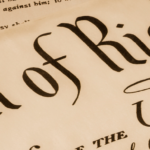Can GPS evidence be used in court? Not always!
In January 2012, the Supreme Court unanimously affirmed a lower court ruling that police acted illegally when they attached a GPS tracking device to a suspect’s car without a valid warrant.

The Fourth Amendment Protects Against Unreasonable Search and Seizure
Though the justices in United States v. Jones agreed that such an action was a violation of the Fourth Amendment, which affords protection against unreasonable search and seizure, their decision by no means clarified when the use of GPS evidence and other technology in court becomes an illegal invasion of privacy.
The decision included three opinions, each employing three different legal rationales, and courts around the country have been struggling to determine how to apply precedent in a world where privacy and technology conflict and the slow-moving judicial system struggles to keep pace with the rapid technological development.
The Shield of Constitutional Rights
In the realm of criminal defense, the United States and Michigan constitutions serve as the bedrock for protecting the rights of individuals against the formidable power of the government. At LEWIS & DICKSTEIN, P.L.L.C., a premier Michigan criminal defense law firm, we harness these foundational legal documents to mount aggressive, effective, and passionate defenses for our clients, whether they face misdemeanor or felony charges in state or federal courts.
The U.S. Constitution, with its Bill of Rights, alongside the Michigan Constitution, offers a myriad of protections that are critical in the defense of criminal charges. Key among these protections are the Fourth Amendment’s safeguard against unreasonable searches and seizures, the Fifth Amendment’s protection against self-incrimination, and the Sixth Amendment’s guarantee of a speedy trial, an impartial jury, and the right to counsel.
Fourth Amendment: The First Line of Defense
In criminal defense, the Fourth Amendment is often the first line of defense. Unlawful searches and seizures can lead to the suppression of evidence, fundamentally altering the course of a case. At LEWIS & DICKSTEIN, P.L.L.C., we meticulously scrutinize the circumstances surrounding any search or seizure to ensure our clients’ rights are not violated. If evidence is found to have been obtained unlawfully, we aggressively advocate for its exclusion, potentially leading to reduced charges or even dismissal of the case.
Fifth Amendment: Protecting the Right to Silence
The Fifth Amendment’s protection against self-incrimination is a cornerstone of fair legal proceedings. Our attorneys counsel clients on their right to remain silent, ensuring they do not inadvertently compromise their defense. This amendment also underpins our strategies in negotiations and at trial, where we safeguard our clients against prosecutorial overreach.
Sixth Amendment: Ensuring Fair Trial Rights
The Sixth Amendment guarantees critical rights such as the right to a speedy trial, an impartial jury, and legal representation. LEWIS & DICKSTEIN, P.L.L.C. leverages these rights to ensure our clients receive a fair trial. Whether it’s challenging jury selection processes, advocating for timely proceedings, or providing unparalleled legal representation, these constitutional protections are integral to our defense strategies.
Michigan Constitution: Additional Protections
While the U.S. Constitution sets the national standard for rights, the Michigan Constitution can offer additional protections to individuals within the state, including using GPS evidence in court. Our firm is adept at navigating the nuances between federal and state constitutional law to provide our clients with the most comprehensive defense possible. We are particularly vigilant in applying any state-specific rights that can benefit our clients, ensuring their defense is as robust as possible.

Privacy and technology in practice
United States v. Jones raises many questions about the degree of privacy Americans can expect from the advances in technology that have the potential to increase government surveillance and interference in citizens’ private lives significantly. Supreme Court Justice Sotomayor cautioned that “the government’s unrestrained power to assemble data that reveal private aspects of identity is susceptible to abuse”, and this is undoubtedly the case, especially when the constitutional boundaries are still in the process of being drawn.
A 4th Amendment Violation Can Prevent the Introduction of GPS Evidence in Court
The erosion of the Fourth Amendment is evidenced around the country as judges fail to consistently apply the Jones decision, many reaching different and conflicting conclusions in various situations. In March, for example, a similar case, United States v. Fisher, was appealed in the State of Michigan. The court denied Fisher’s motion to suppress evidence gathered from a warrantless GPS device, deciding that the police’s decision to employ the use of technology was made in good faith. The Court also found that officers were acting within the law, and therefore such action did not constitute a violation of the Fourth Amendment.
Clearly, the law surrounding these cases is murky and ill-defined, posing a risk to the certainty of legal decisions in these cases. The tide of technological development and its increasing use by law enforcement is unlikely to abate, making such ambiguity particularly relevant.

Michigan Criminal Defense Attorneys – Your Best Hope Starts Here!
If you, or someone you know, is charged with a misdemeanor or felony and you feel your rights were violated by the unconstitutional use of technology or an unreasonable search or seizure, the good and affordable defense attorneys with LEWIS & DICKSTEIN P.L.L.C. can help. We have decades of experience defending people charged with criminal offenses and seeking the suppression of evidence taken in violation of the United States Constitution. When your freedom is at stake, it is crucial that you have the best legal representation available. Call us to discuss your situation. We will find a way to help you!
Call us today at (248) 263-6800 for a free consultation or complete an online Request for Assistance Form. We will contact you promptly and find a way to help you.












